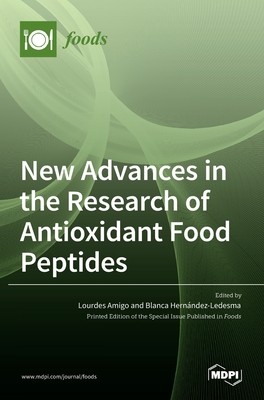
- We will send in 10–14 business days.
- Publisher: MDPI AG
- Year: 2021
- Pages: 154
- ISBN-10: 3036525203
- ISBN-13: 9783036525204
- Format: 17 x 24.4 x 1.4 cm, hardcover
- Language: English
- SAVE -10% with code: EXTRA
New Advances in the Research of Antioxidant Food Peptides (e-book) (used book) | bookbook.eu
Reviews
Description
During cell metabolism, oxygen is partially reduced to reactive oxygen species (ROS) that play a physiological role in cellular processes. However, an imbalance between the production of ROS and the ability of defenses to detoxify the organism provokes oxidative stress. Oxidative stress and its subsequent damages to vital cellular components have been associated with numerous severe chronic disorders. In addition, oxidation reactions are responsible for food deterioration during processing and storage. Peptides from animal and vegetal food sources have attracted attention due to the large evidence of their in vitro antioxidant properties. In addition to their potential as safer alternatives to synthetic antioxidants used to prevent oxidative reactions in foods, antioxidant peptides can also act by reducing the risk of numerous oxidative stress-associated diseases. Furthermore, peptides can act synergistically with nonpeptide antioxidants, enhancing their protective effect.
This Special Issue of the Foods journal includes outstanding papers illustrating examples of the most recent advances on antioxidant peptides from both vegetal and animal sources. The existing data on their bioactivities demonstrated by in silico, in vitro, and animal models are included as well as the mechanisms of action of identified antioxidant peptides.
EXTRA 10 % discount with code: EXTRA
The promotion ends in 16d.05:54:16
The discount code is valid when purchasing from 10 €. Discounts do not stack.
- Publisher: MDPI AG
- Year: 2021
- Pages: 154
- ISBN-10: 3036525203
- ISBN-13: 9783036525204
- Format: 17 x 24.4 x 1.4 cm, hardcover
- Language: English English
During cell metabolism, oxygen is partially reduced to reactive oxygen species (ROS) that play a physiological role in cellular processes. However, an imbalance between the production of ROS and the ability of defenses to detoxify the organism provokes oxidative stress. Oxidative stress and its subsequent damages to vital cellular components have been associated with numerous severe chronic disorders. In addition, oxidation reactions are responsible for food deterioration during processing and storage. Peptides from animal and vegetal food sources have attracted attention due to the large evidence of their in vitro antioxidant properties. In addition to their potential as safer alternatives to synthetic antioxidants used to prevent oxidative reactions in foods, antioxidant peptides can also act by reducing the risk of numerous oxidative stress-associated diseases. Furthermore, peptides can act synergistically with nonpeptide antioxidants, enhancing their protective effect.
This Special Issue of the Foods journal includes outstanding papers illustrating examples of the most recent advances on antioxidant peptides from both vegetal and animal sources. The existing data on their bioactivities demonstrated by in silico, in vitro, and animal models are included as well as the mechanisms of action of identified antioxidant peptides.


Reviews